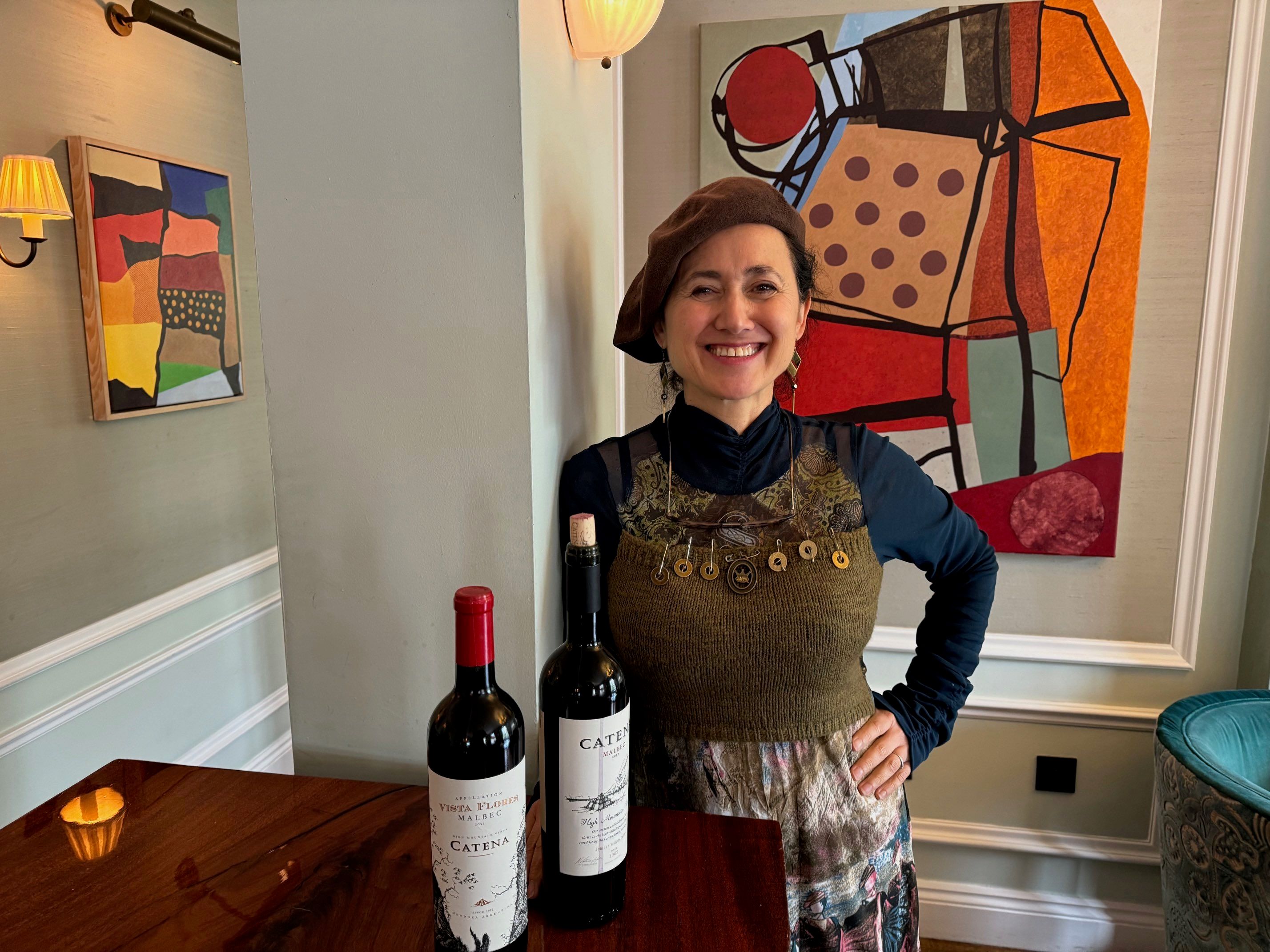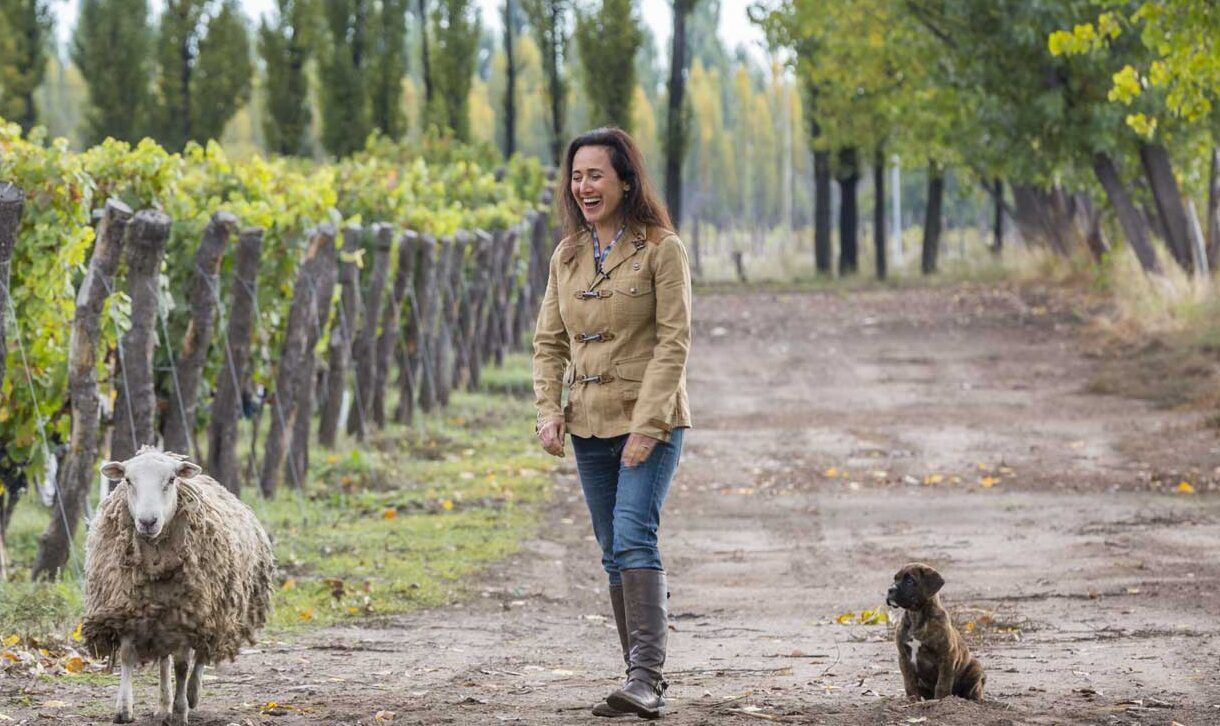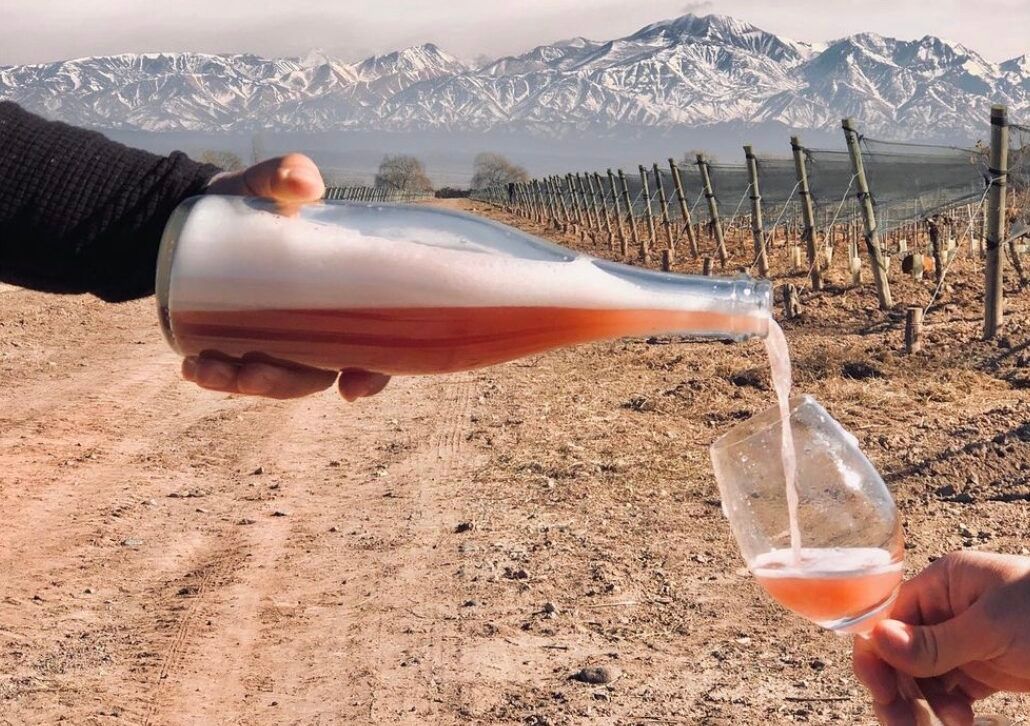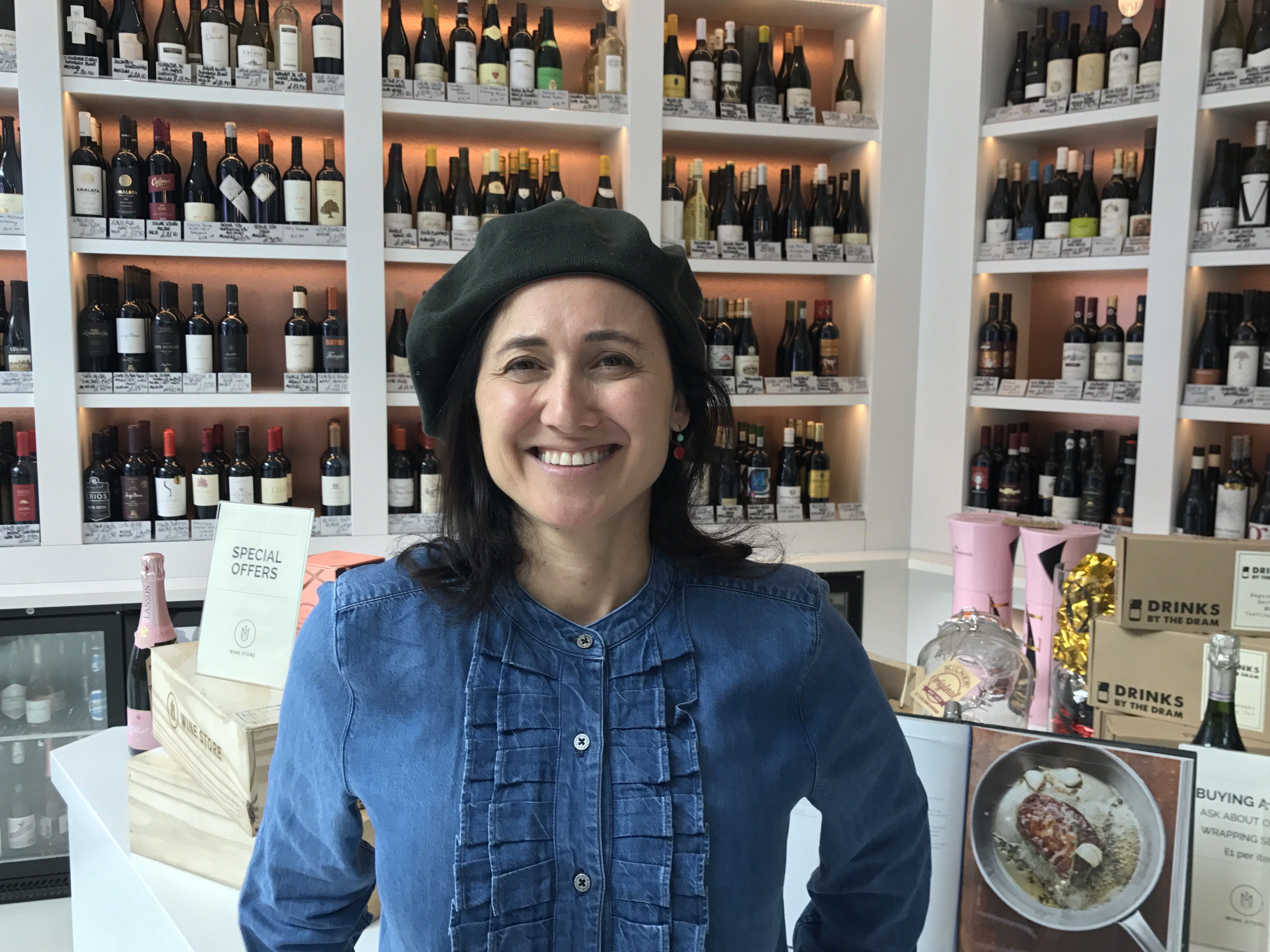Lighter wine bottles have a lower carbon footprint and are better for the environment. That’s pretty much an accepted fact the world over. It’s also the strapline that Catena is using to help spearhead a new educational campaign to help promote the wider use, acceptance and understanding of lighter weight bottles across the on and off-trades.
Catena has been looking to play its part for some time and has collaborated with local glass manufacturer Verallia (a subsidiary of the French Saint-Gobain) to reduce the overall Catena Family wines bottle weight by 40% between 2008 and 2023, and is now using 1,200 metric tons less glass a year.
Catena now wants to go further and is introducing a 45% reduction in the weight of its Catena Appellation wines in some markets - a reduction from 700 to 380g per bottle. Catena says the average weight of its wines across its range is 416g vs a global average of 550g, and 97% of its wines are in bottles that weigh less than 510g.
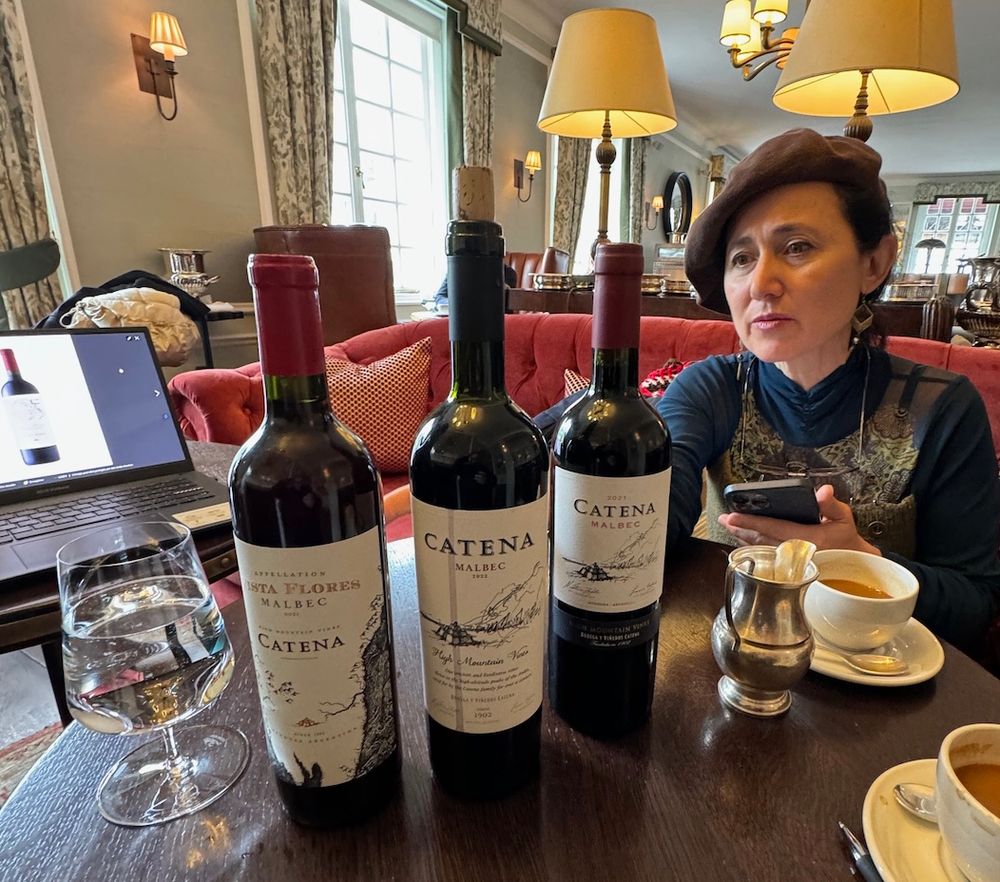
Laura Catena shows what her lighter weight bottles look like at London's 67 Pall Mall
Catena is also reducing the weight of its Catena High Mountain Vines line - its best selling luxury cuvée that is exported to 72 countries - by 28% from 700g to 500g.
Despite these impressive figures, Laura Catena insists the industry as a whole needs to make a change, and she wants to be that change agent out of Argentina for other producers both locally and internationally to follow.
Sustainable sense
Catena is also quick to stress that the switch to lighter weight bottles has to be done in a way that is sustainable for wine businesses to manage.
Catena has worked hard, she says, to build her family winery’s position as a fine wine producer in its own right that can proudly stand alongside other leading wineries all over the world. Catena and its team have astutely followed Nicolás Catena’s ambition, inspired by California’s Mondavi family, that it too can make Grand Cru standard wine in Argentina.
Which means competing in what you might call the heavy bottle part of the fine wine world. Pick up a bottle from many of the major players be they in Napa, Bordeaux, Burgundy or Tuscany and their reputation, class and quality is also signified by the weight of the bottle. It might not be climate-friendly, but it’s a fact that can’t be dismissed.
As a business leader it would, in fact, be reckless to your staff and the 100s of families that rely on your company for their livelihoods to do anything that could potentially, at a stroke, risk their personal futures, she explains.
“I approach this topic with a scientific mind. Wine has to lower its bottle weight. That is fact. But we must do it in a sustainable way. We can’t afford to lose sales of our high-end wines.”
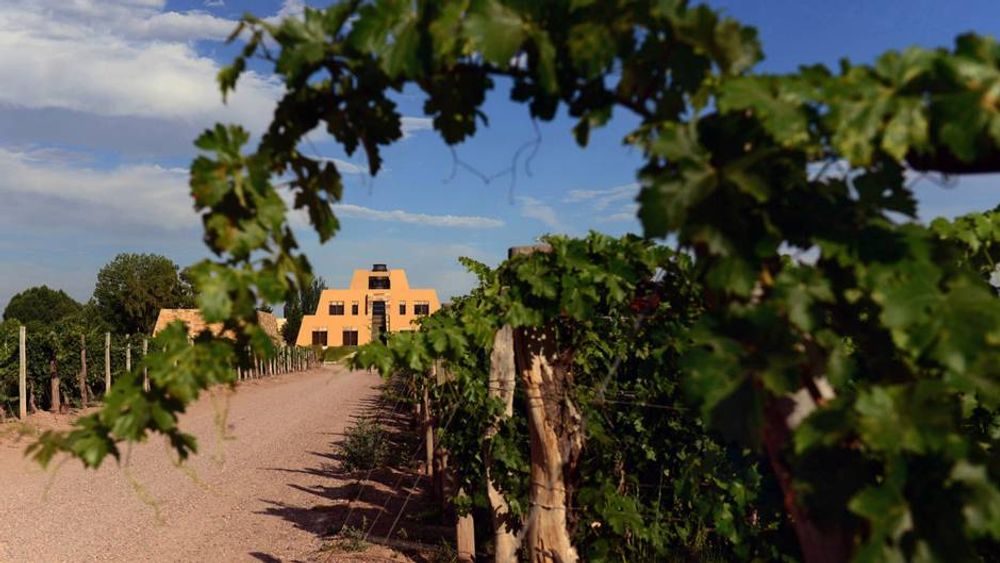
Laura Catena says switching its high end wines to lighter bottles has to be done in a sustainable way in terms of looking after its workers
“We feed mouths,” adds Catena. “People rely on us. We have to find a way to show we can all bottle high end fine wine in lighter weight bottles. It would be transformative for the global carbon footprint of wine. However, we would not be doing a service to the Argentine people if we currently reduced the weight of our very top end wines.We have been told by importers and trade particularly in North and South America and in Asia that consumers expect their finest wines to come in heavy bottles.Europe is definitely leading the way in terms of educating its wine lovers about the environmental benefits of light weight bottles.”
Yes, in time, Catena hopes the whole ultra-fine wine category globally will make serious moves to lighter weight bottles, but Catena can’t win the fight alone. Particularly as the Chinese and Asian markets still prefer to see their fine wines in heavier bottles.
“We have to see a change in attitude by consumers” says Catena, “particularly in the high-end US wine market. It makes it so much harder if the bottles there do not change,” she says. “There is no reason to have heavy bottles. We are drinking wine for the juice, not the bottle.”
Educational push
To change things at the ultra-high end requires a change in culture and attitudes from the wine consumer too. “It is hard to balance sustainable needs with consumer perception,” she adds.
Which is why Catena is keen to move the dial in two ways: by physically reducing the weight of its bottles; but also through education and a new campaign to open as many people’s eyes as possible to what impact the weight of a bottle of wine can have.
Catena has created a quick multiple-choice quiz that people can take - be they working in the trade or wine drinkers at home - that helps get the key messages about bottle weight across.
“If you show people in the U.S. a heavy or light bottle and ask them which one they prefer, then 100% will say the heavy bottle. But if you then tell them the heavy bottle is bad for the environment then 100% will switch and say they will buy a lighter bottle,” she claims.
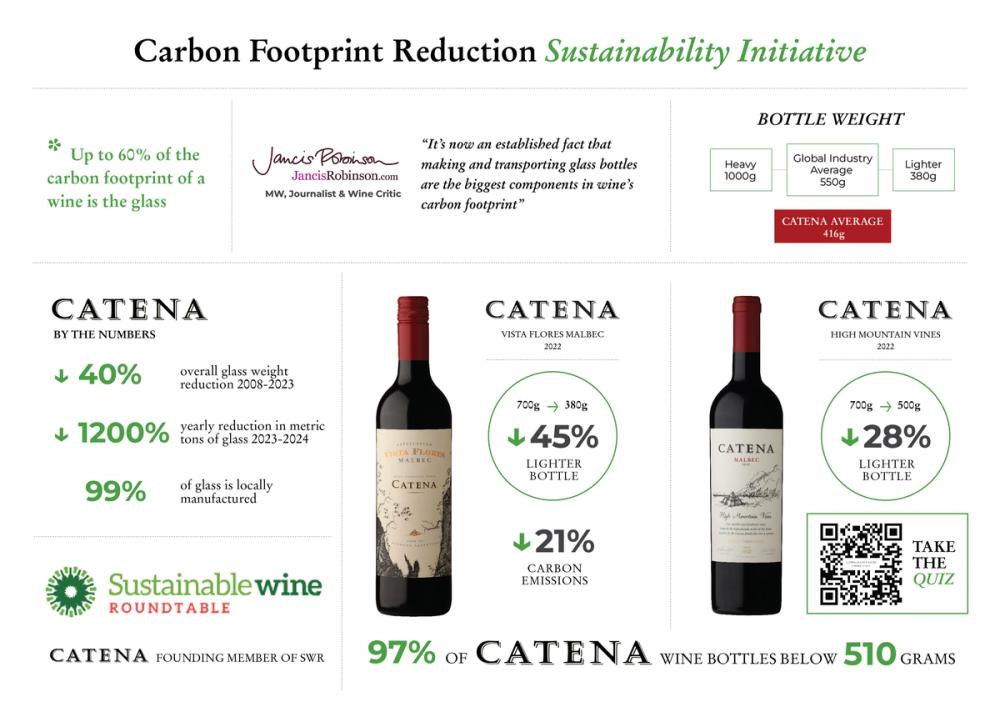
The facts and figures behind the move to lighter weight bottles. Use the QR code to take the multiple choice quiz that Catena has created to help educate both the trade and consumers about the impact of glass and bottles on sustainability
Which is what the multiple-choice quiz hopes to achieve. Catena likens it to the teaching she used to give as a doctor to students which works on the mantra of “see one, do one, teach one”. See an injury. Learn how to fix it from a more senior doctor, and then you know how to teach someone else to do the same.
Catena is now working with its importers, including Bibendum and C&C in the UK, to help roll out this “viral” education training to its sales teams to show to their customers and their staff.
The idea, she says, is to get that conversation going on the restaurant floor, amongst sommeliers and serving staff so they can share the information and even the quiz with their guests.
“When you first do the quiz, you will get some answers wrong. But after reading the information, if you do the quiz again, you will get all the answers right. And now you will have real data to share with your customers,” Catena adds.
Pushing suitcases
Catena says the luxury goods market is already helping to make the argument that lighter is better. Take the luxury suitcase sector. It has been able to use technology and better packaging materials to convince consumers that the lighter the suitcase the more valuable and expensive it should be.
It is an example that has really resonated with people as they can see it in their everyday lives. “Sometimes you have to try 100 things for one to work, but you have to keep trying to see what sticks,” she adds. “The suitcase analogy really works.”
We now need to see the luxury drinks market as a whole following suit, she argues, but there does not seem to be the same pressure, or interest to lower bottle weight across the luxury spirits categories like whisky, cognac, or even with Champagne.
Catena appreciates it is going to take time to win consumers over as the heavy bottle culture is so “engrained” in how people perceive fine wines. The situation, she adds, is also complicated by the fact some of the major monopolies around the world only restrict weight on their volume brands, which is helpful in the short term for carbon footprint, but which might lead consumers to identify rare and expensive wines by their heavier bottles.

It’s why Catena is particularly keen to support the industry-wide efforts of the Sustainable Wine Roundtable (SWR) and is fully behind its initiative to get a dramatic downturn in the weight of wine bottles across the industry with its Bottle Weight Accord.
SWR is asking its producer partners to sign an accord stating that they commit to reducing the average weight of their 750ml bottles to below 420g by the end of 2026 (current wine bottle weight average is 550g). The key, says Catena, whose Catena Institute of Wine is a founding member of SWR, is how the retailers who are part of SWR help the wine producers to communicate with the consumer that although the weight of the bottle has gone down, the quality of the wine has not changed.
“In the end,” says Catena, “we need more companies and businesses communicating the need for lower bottle weights to reduce carbon emissions. We need to convince the consumer if we want an alcohol-industry wide adoption of lighter bottles. If consumers say they won’t buy heavy bottles that will have the biggest impact of all.”
Catena and glass in numbers
- The global industry average wine bottle weight is 550 grams empty.
- The Catena Family Wineries bottles currently average 416 grams empty overall.
- Catena is reducing the bottle weight of Catena Appellation Malbec from 700 to 380 grams in some markets.
- This results in an average CO2 emissions reduction of 21% before boat transport.
- Catena High Mountain Vines Malbec and Cabernet Sauvignon (all export markets) is being reduced from 700g to 500g, representing a 28% reduction in glass weight.
- The Catena Family Wineries averaged a 1,200 metric tons drop in the use of glass in 2023.
- From 2008 to 2023 the Catena Family Wineries reduced by 40% its overall bottle weight.
Local Initiatives
- 99% of Argentine wine glass is produced locally in Argentina and Chile.
- Catena is working alongside local glass manufacturers, such as Verallia (Saint-Gobain France subsidiary) to reduce bottle weight.
- Catena is working with LSQA (a Uruguayan-Austrian company) to create a carbon calculator that will be shared widely with Argentina’s wine producers.
- In 2010 Catena shared its in-house sustainability code with Bodegas de Argentina (a local group which includes hundreds of wineries) to establish the Bodegas de Argentina Sustainability Code.
- Catena was the first winery to certify, and today hundreds of Argentine wineries are enrolled.
- The Catena Institute of Wine is studying ways to reduce carbon emissions by sequestering carbon in the vineyards, planting trees and preserving native forests, measuring inputs and outputs and studying alternative energies.
Lighter Wine Bottle Education Campaign
- Catena Appellation Vista Flores Malbec is being used to champion the education campaign in the US through its strong by the glass listings in key outlets across the country in both the on and off-trades including national chains such as Fogo de Chao and NOBU and independent restaurants like Little Basil in New York, Izzy’s Steak and Chops in San Francisco, and Water Grill in Los Angeles.
- All Catena Appellation brand wines to importer and retailer Gall and Gall (with 600 stores in Holland) will be bottled in the lighter glass. Ahold Delhaize (which owns Gall and Gall) is a founding partner along with Catena of the Sustainable Wine Roundtable. In-store displays and staff training will educate consumers about the environmental benefit of ultra-light bottles.
- The Catena ‘High Mountain Vines’ wines will transition to a new 33% lighter bottle, which is a bit taller and thinner. The wine is Catena’s best-selling luxury wine distributed in 72 countries. Catena is working with C&C for the roll out in the UK with other campaigns across Europe and the US.
* Catena Zapata is distributed in the UK by Bibendum and the C&C Group - commercial partners to The Buyer.
